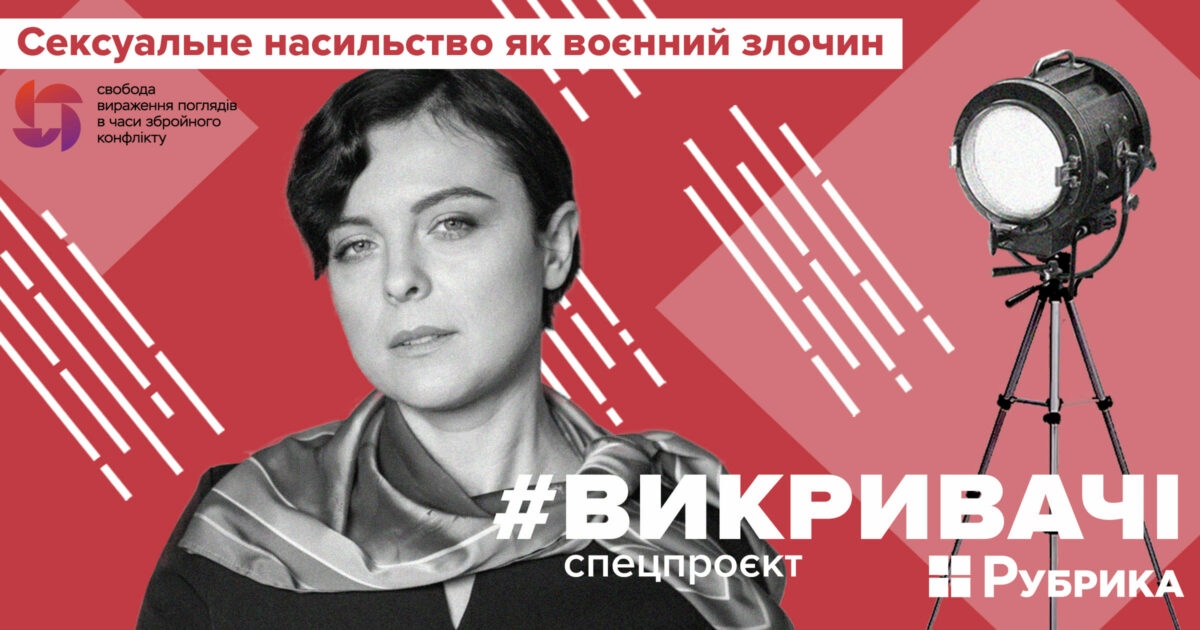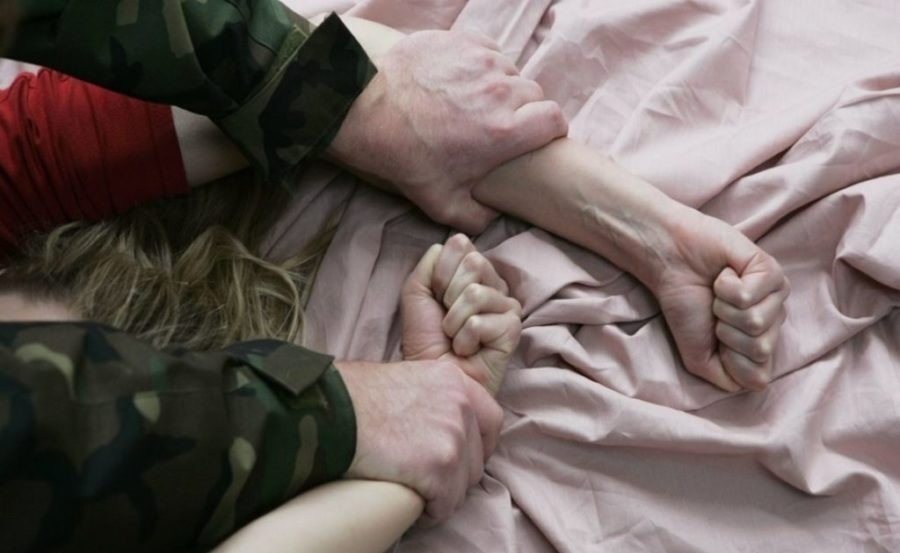
Sexual violence is one of the crimes regularly committed during armed conflicts. International criminal law defines it as the most severe and inadmissible crime. Lawyers say these acts are one of the most traumatic experiences in a person's life, which affect the victim's physical and psychological state.
Today, during russia's full-scale war in Ukraine, sexual violence is being perpetrated by russian troops against civilians. Therefore, it is vital to ensure that survivors receive timely medical and psychological care. It's also necessary that Ukrainian women or men who have been abused receive quality legal support and that all perpetrators be brought to justice.
For this to happen, JurFem Ukrainian Women Lawyers Association has been providing legal assistance to victims of war violence since the beginning of the full-scale invasion. Find out the procedure of recording a sexual war crime, the foremost needs of victims, proper communication, and punishment of the guilty in an interview with the head of the public organization, JurFem Ukrainian Women Lawyers Association, a lawyer, Ph.D. Khrystyna Kit.
— Khrystyna, when sexual violence becomes a war crime?
— It matters where it was committed, under what conditions, and who committed it. Sexual violence becomes a war crime in an area where an armed conflict occurs, an occupied territory, or an area being captured and if the military is committing it. In these circumstances, we can assume that the invaders committed a war crime against the civilian population.
— In the first two weeks of April, the free psychological support hotline for victims of sexual violence received 400 calls. As a lawyer, have you grasped the scale of these crimes?
— In my opinion, any figures mentioned now by law enforcement officers, authorities, and human rights organizations cannot correspond to reality because we don't know as of today how many such crimes the russian federation committed. First, the war continues; second, there are now temporarily occupied settlements; third, a significant bulk of people from liberated territories who've experienced sexual violence may not be willing to talk about what happened to them. I don't want to name any numbers now; they will not be correct. We can only talk about official statistics registered by law enforcement agencies.
But I'm convinced that the crimes of conflict-related sexual violence perpetrated by russian servicemen are not uncommon. From the data of law enforcement officers and interceptions of the russian servicemen's conversations, published by the Security Service of Ukraine (SBU), it is clear that sexual violence is the tactics and tools they apply against the civilian population. They're doing this deliberately to intimidate people, show their power in the temporarily occupied territories, and destroy us as a nation. We can say that it is a crime of genocide against Ukrainian citizens. I think that over the next few decades, we will receive information about more and more facts of these crimes.
— As of now, how many people who've been abused have turned to your Association for help?
— Our legal support line started working in early April. We now have over 20 applications for legal aid, but these are not just the calls about conflict-related sexual violence. We're called, for example, by women and girls who've been sexually harassed and raped not in the occupation or in the war zone before the full-scale invasion began or in areas with no active hostilities. This violence is not related to armed conflict. The people who've suffered not only from sexual but also from domestic violence call us. The problem of violence against women hasn't disappeared. We now have three appeals if we talk about sexual violence related to the conflict. So far, none of these women wanted to report to law enforcement. They called to find out what protection they have as of today.
"If a person is ready to testify, it's important to help them remember and record everything"
— What help can JurFem Ukrainian Women Lawyers Association provide to people who've been sexually abused?
— When a person calls us, they either want to tell us what happened to them or ask what their next steps may be. If a person doesn't want to tell their story but is interested in what rights they have, then our task is to tell them where to turn for help, how the authorities are working in this direction, and to recommend where to go for psychological support. We had a case when a person called and said that she wanted to talk about sexual abuse of her and wanted to appeal to law enforcement. Then we communicated with the person and tried to record as much information as possible about what had happened to describe it in a statement to law enforcement agencies. We usually find out what a person remembers, whether they sought medical help, whether there are witnesses to the crime, and so on. It is provided that the person speaks for themselves. If not, we ask if they need psychological help and recommend psychotherapists with whom we work; so that a person can somehow cope with this trauma. When it comes to legal support, it is crucial for us as lawyers/attorneys when a person says that they're ready to speak, to help them remember and record as many circumstances as possible that happened to them.
Don't create a stir. Don't emphasize the numbers
— What mistakes do society, media, lawyers, and relatives make when communicating with victims? How do we avoid them?
- First, often in external communication, we want to make a stir out of a person's trauma, to tell as many details as possible. But it helps neither the person who survived the violence nor society to respond adequately to what happened. It hurts. Sometimes they say the more we talk about sexual violence cases, the more we draw attention to it. That's right, but the difference is how we talk about it. Therefore, it is crucial to understand that a person can recognize themselves in a detailed story. It is unpleasant, dangerous, and threatening. People are worried about their safety and privacy.
- Second. It is important to remember that first, we are dealing with a person, with their needs and anxieties, and not with the "case." Listening to human needs is crucial. It means that only a person who has experienced sexual violence or trauma may decide whether they want to contact the police, whether they want to tell all or part of it, or whether they want to receive any other help.
- Third. We can hear things from people like, "Why was she in that place? Why did she stay? Why didn't she evacuate when possible? What did she do to keep it from happening to her?" These words show that, unfortunately, we haven't realized our misperception of sexual violence yet. We cannot ask victims why they didn't leave the place, didn't shout, didn't run away, and what they did after it happened. These questions are unacceptable and illustrate our attitude towards sexual violence victims as those whose behavior led to what happened to them.
- Fourth. Increased attention to numbers. What is the number of sexual violence victims? We pursue these stories without realizing that people have other needs that the state must meet. More than 7 million internally displaced persons in Ukraine, including children, women, and men, may be victims of sexual violence. The primary needs are medicine, medical care, and money, besides a safe place to live. These people will not come to us and tell us that they have been sexually abused and will not ask for help until they feel physically safe and secure in meeting their primary needs. Therefore, I think it is worth changing the focus on what the sexual violence victims now have as their immediate needs and what we can do to meet them. And it's a question not only for the central authorities but also for the local communities that receive internally displaced people. We need to pay attention to what we say, how we communicate, what messages we send, and whether we are ready to hear about the needs of those who come. We cannot talk about protecting victims of sexual violence if they don't have the infrastructure and a safe environment.
— You live in Lviv, the city that has become a humanitarian hub for internally displaced persons. Do you have conditions for IDPs that you are talking about?
— I know that there are talks in Lviv, in particular, about creating a center for sexual violence victims, where they could receive psychological, medical, and legal assistance. It is a distant prospect, but Lviv NGOs are doing a lot. Many women's human rights organizations have also moved to Lviv from Kyiv, and they now provide humanitarian, psychological, and medical care to internally displaced persons. Is that enough? Maybe not. We still need to work with information drives and messages in integrating internally displaced persons into the community, helping survivors of violence, and so on. We have something to work with in the info field and the community.
When we talk about helping victims of sexual violence, we should focus not on numbers—not on how many people applied and who reported what—but explain that sexual violence has no statute of limitations and that a victim can receive psychological and medical care, has the right to seek legal help at any time and that the authorities have created conditions to which they can apply. For example, the National Police has set up special groups to respond to cases of sexual violence, which a person can use in confidence. It's necessary to explain to the person how the law enforcement ensures confidentiality, that it can change or hide the personal data, that the meeting can take place behind closed doors, and that the victims have the right to compensation for moral and material damage if they ask for help and the offender is brought to justice.
— What should we talk more about now in the context of helping victims of sexual violence in war?
— It is necessary to speak more about victims' rights and what protection they can receive than about details of stories already taking place in our information space. It is also important to contact law enforcement. You can do it not at the registration residence but in any locality with the support of our Jurfem lawyers. We are ready to help you make an application, contact the relevant authorities, and support you at all stages. It is also worth remembering that Ukraine has a system of free legal aid. They also accompany the lawyer to those who've experienced sexual violence.
— Special mobile police teams deal with crimes related to sexual violence, travel to liberated settlements, interview residents, and record the available information. In your opinion, do locals come into contact? Is there any stigma in this matter?
— From the point of view of experience and work with cases of sexual violence that we had before the war, I can say that one of the reasons why the victims were not ready to talk about sexual violence is that "someone will find out." Professionals who work with people who have experienced sexual violence understand this. Often, even close relatives don't know that a person has experienced sexual violence. Therefore, it is good that groups of law enforcement officers communicate with residents of communities and talk about the possibility of receiving help, about centers, and areas of support. Of course, not everyone will ask for help, but having the information, a person will at least know what opportunities they have. That is why sometimes, with much effort, we don't immediately have the result we would like for the victims' appeals. It takes time, and we need to realize that.
The victim's words may be enough
— How do we correctly provide information about sexual violence, particularly the details of this violence, not to hurt the victim?
— We prepare for any communication and think over what questions are essential to ask. We explain to them we can make records. If we have an opportunity and the person agrees, it's imperative to make a video, then transcribe it. A person can seek legal assistance while abroad. Then we communicate online and, with the person's consent, make a record, and then, based on it, make a statement and a survey protocol.
If a person turns to us, we allow them to tell this story. We understand that those who've experienced trauma, including sexual violence related to conflict, may not remember all the details; they do not have to remember them. Victims may remember one part of the story today and recollect the next tomorrow. Psychotherapists explain it is an entirely normal condition that a person can forget specific details. One should understand this when communicating with a victim of sexual violence.
We ask people about where it happened, the time, what details of the criminal's clothes they remember, what language he spoke, and what names he used. Every circumstance matters. After all, there may be a situation where the same people could commit sexual violence against other victims. Therefore, together all the details are essential.
As lawyers, we remember that everything we do is only with the victim's consent. For example, today, a person is ready to report to the police, and tomorrow they say no and talk about the need for treatment, relocation, etc. We, for our part, only do what a person says. We also ask about medical documents. If a person has not sought medical help, we recommend that they apply and pass the tests, which they may primarily need not for evidence but safety. We know the practice of the ICC [International Criminal Court, ed.], which states that in the absence of witnesses and medical documents, substantial evidence is the victim's testimony. That's why we always try to tell people not to worry if they think they have nothing to confirm their words. The words of people who've experienced violence are also important, and we can report them to the police and prove that the person has been abused. Even the words of a person who has experienced sexual violence may be enough to report to law enforcement. There is information about the presence of russian troops in certain territories in the relevant departments, so all this can be established and proven.
— Do you mean evidence in national law or international law as well?
— International law as well. Because the position of the ICC is that in some situations, only the testimony of the victim may be enough to establish the guilt of the person who did it and bring them to justice. So, in the national context, we must understand that a person may have no other evidence. There can only be their words, and they are also important.
— What difficulties may the police face during the investigation and the court when considering such cases and sentencing?
— We are all now learning to deal with cases of sexual violence related to the conflict. In 2014–15, of course, there were facts of war crimes, and there was sexual violence against civilians, but not so massively. We, unfortunately, did not use this time to learn to work with such things. So now we must think about how we should cooperate. Here, it is crucial to understand that lawyers, judges, and prosecutors need to coordinate which evidence is relevant, which is admissible and which is not, which the court may accept, and which it will reject because one may have obtained it in violation of procedural law. It is essential to have uniform standards for investigating such cases.
It is also vital that everyone understands we must not allow the victim to be re-traumatized. We can't let a person testify several times to the prosecutor's office, the police, the court, or a lawyer. We are now talking about the fact that our legislation stipulates that we can request the victim's interrogation in court during the pre-trial investigation. Then the person testifies once and for all at the court hearing. Further, participation is not obligatory. We are learning this now, and together we are trying to optimize for it to be so.
The trial procedure and the evidence collection also need to be followed. For example, regarding the prosecution of a russian serviceman who killed a civilian man, there were many questions as to whether the trial was conducted well enough or whether the accused would have grounds to overturn the decision. We live in a state governed by the rule of law. It is in our interests—regardless of who we judge—to do so in strict accordance with the procedure and the letter of the law so that there will be no claims against us even from international bodies.
— Are there any cases of sexual violence committed by the russian occupiers already brought to court?
— As far as I know, one case was sent to court. The other day, the Deputy Interior Minister spoke about 16 registered criminal cases of sexual violence related to the conflict. We now have the challenge of ensuring the confidentiality of these cases. For example, we cannot hold a public trial. Both journalists and society must realize this. In these cases, we cannot cover everything publicly. Still, it is worth saying that such a crime took place and that the consideration of this case is already beginning so that we don't get the impression that everything is closed and we don't talk about anything in public.
— How do lawyers, human rights activists, law enforcement agencies, courts, etc., consolidate efforts and work together? Is it successful?
— Now we manage it not wrong because now we don't have many registered cases. Therefore, it may seem to us it is easy to coordinate because we have recorded several criminal proceedings, and we are working on them. But this should not be the case. The system should work in a coordinated and efficient manner, regardless of the number of registered criminal proceedings. For this to happen, it is necessary to develop specific standards and rules that are common and adhered to by all. Both the bar and law enforcement, and the judiciary must adopt them. We can then ensure this coordination in proper procedures, respect for the rights of both victims and defendants, and ensuring that these categories of cases are dealt with effectively. I see everyone has the understanding, will, and desire for this: the judiciary, law enforcement agencies, and the bar. I believe it will be possible.
"Our task is to tell the person about options and consequences and give time"
— Are there victims of violence who aren't ready to share their stories? In your opinion, why is this happening? Should they be persuaded to share?
— I would convince no one because I think it is unethical, and I am confident that colleagues who work with these cases are in solidarity with me. Our task is to tell the person what options they have for deciding, what may be a consequence of the decision, and to give time for, in fact, the conclusion. Suppose a person says they are not ready to talk about it now. In that case, we cannot persuade them, pressure some patriotism, the interests of Ukraine and society, or other victims because it harms them and will bring nothing good in the future. People then shut up and will not speak at all. If a person knows that when they come to lawyers to ask about their rights, they will persuade them to go to law enforcement and put pressure on them, they will not want to go. Here is another point: persuading the victim is also one of the forms of violence, so we should not be like rapists. We need to understand that a person must have space and the right to make decisions and feel that they have been allowed to choose whether they are ready or not. This is a matter of nonviolent communication that we need to develop.
— Are there cases when the victim takes the statement from the police after threats or condemnation?
— There are various reasons people do not want to write a statement.
- Everyone's situation is unique, but one of the most common is that a person doesn't want anyone to know about it and feels the danger of condemnation.
- A person may feel that they told it in vain and would get no feedback and result from what they said. To be ready to speak, a person must understand what will happen after telling their story. For example, we can explain that they can file a complaint with the police. If they're afraid that the police will disclose data, there is a mechanism of confidentiality; we may submit this statement in another region, and the investigators may classify the data.
- A person may be afraid that they will be asked questions they will not be able or unwilling to answer. We should then explain that a lawyer will always accompany the victim and say, "You have the right not to answer questions you do not know the answer to or are not ready to answer."
- Based on the needs of each person, you need to choose a list of communications. If a person needs the help of a psychologist or psychotherapist and they do not know how to say it, then we can provide such support. If a person requires shelter or food and clothing, and you tell them about contacting the police, no matter what you say, they will not hear you.
Therefore, whenever we talk about helping victims of sexual violence, we need to hear their needs. The person may need to come and tell what happened to them, and they don't want to go to the police and want to hear what you have to say about it and take time to think. It is also a critical need. The fact that they came is already a huge step.
A war crime is different from non-wartime sexual violence. For example, when the rape took place in Lviv, where there was no military action, and a serviceman did not commit it, it was not a war crime. In this situation, whether a person has filed a statement, whether they support it or subsequently refuse, is vital because it is a matter of private prosecution and sexual violence. Therefore, when a person withdraws this statement, the investigation is not conducted accordingly. When we talk about sexual violence as a war crime, it is another article of the Criminal Code of Ukraine and a crime of public prosecution. That is, the case is not closed even if a person in the future doesn't want to communicate with law enforcement, testify, or participate in the pre-trial investigation. A person may not walk or testify, but the task of law enforcement agencies is to bring the case to an end, to find all the evidence, even without the victim's participation.
"It is important not to ask specific questions"
Rules for the media
— How can the media correctly cover topics related to sexual violence in war? What norms must they follow?
— First, I have talked to many journalists, and you can always see when a person understands what sexual violence is and when they have never worked on this topic. Therefore, when preparing for the article, you must know whether you are ready to work on this topic. If you are not ready, you will ask such questions as, for example, foreign journalists asked me. They said, "If you don't let us talk to the most affected person, then everything you tell us doesn't matter because we get the impression that you made it up yourself." Therefore, it is critical to determine whether you are ready to work with the topic.
Second, decide what you want to communicate if you have the opportunity to speak with a person who has been sexually abused. If you want to tell their story, that's not something that can be the subject of a journalistic investigation. If you wish to discuss a problem that exists, then you need to ask other questions to this person and not make a sensation out of their personal history.
Third, the critical point is whether the person you are interviewing is aware of and agrees with what you will talk to them about. That is, what this person wants to convey and what they're aware of in a given situation. Are they ready to tell their story in detail, or do they want to talk about the crime and the problem? It is also essential to understand that a person who has experienced trauma, particularly sexual violence, may have certain memory lapses, may not remember something, and may feel in danger. Therefore, it's crucial not to ask specific questions that would allow the victim to be identified: where she is, where she lives now, how it happened, and who it was. Such questions may be inappropriate and should not be covered in the media.
The main thing is to treat a person as a subject of communication, a person with particular needs, and be aware of this and not to traumatize them again. You must understand that a person may think that telling their story to journalists may become the basis for law enforcement, and they will not have to say it anymore. Then you must explain that it is not the case. The person must understand that they are just telling a story, and although it may be the basis for opening a criminal case, they will still have to tell everything again to the police. It is essential to let the person know if they are ready for this and if they are prepared for the fact that this interview may not have any legal consequences. Therefore, such clarifications should also be agreed upon before the interview because people sometimes think that after the publication of their history by journalists, the state should react and somehow protect them, but it does not work.
— Do we need to improve our legislation so that russian rapists are punished?
— Of course, the law drafts amending the Criminal Code of Ukraine regarding war crimes, which were registered (in particular, the first draft was adopted in June last year), would facilitate the work of law enforcement agencies in terms of prosecution for war crimes. For example, Article 438 of the Criminal Code is quite general. It doesn't even contain a list of the war crimes that may occur, particularly sexual violence related to the conflict. Therefore, many questions arise about qualification and statistical reporting on those crimes. However, as of today, based on our mechanisms, it is still possible to bring specific service members of the russian army for committing war crimes to justice.
— Today, everyone is talking about the Istanbul Convention in Ukraine; President [Zelensky] proposed to the Verkhovna Rada [Ukrainian parliament, ed.] to ratify it. On June 20, the Verkhovna Rada considered the bill and supported the ratification of the Convention. Will the adoption of the Istanbul Convention to combat sexual violence in the context of war crimes help?
— Certainly, ratifying the Istanbul Convention is an essential step toward combating violence against women, including conflict-related sexual violence.
The preamble to the Istanbul Convention says the states that have ratified it recognize "the ongoing human rights violations during armed conflicts that affect the civilian population, especially women in the form of widespread or systematic rape and sexual violence and the potential for increased gender-based violence both during and after conflicts."
With this in mind, the states that have ratified it have agreed to work towards preventing violence against women, protecting survivors of violence, and prosecuting perpetrators while ensuring a coordinated policy.
Therefore, of course, the Istanbul Convention provides us with additional mechanisms and opportunities to respond to cases of conflict-related sexual violence. Today our task is to effectively implement the norms of the Convention in our legislation and practice.
Newsletter
Digest of the most interesting news: just about the main thing














